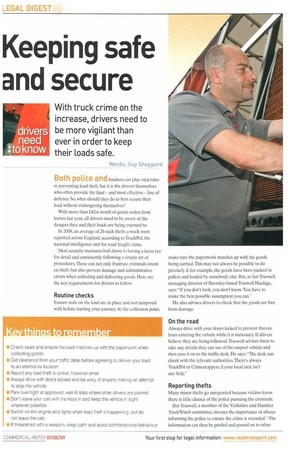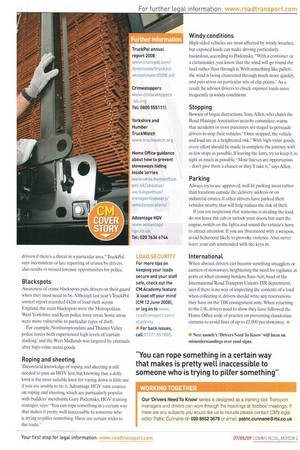Keeping safe and secure
Page 26

Page 27

If you've noticed an error in this article please click here to report it so we can fix it.
With truck crime on the increase, drivers need to be more vigilant than ever in order to keep their loads safe.
Words: Guy Sheppard
Both police and hauliers can play vital roles in preventing load theft, but it is the drivers themselves who often provide the final — and most effective — line of defence. So, what should they do to best secure their load without endangering themselves?
With more than E42m worth of goods stolen from lorries last year, all drivers need to be aware of the dangers they and their loads are being exposed to.
In 2008, an average of 26 such thefts a week were reported across England. according to TruckPol, the national intelligence unit for road freight crime.
Most security measures boil down to having a keen eye for detail and consistently following a simple set of procedures. These can not only frustrate criminals intent on theft, but also prevent damage and administrative errors when collecting and delivering goods. Here arc the key requirements for drivers to follow:
Routine checks
Ensure seals on the load are in place and not tampered with before starting your journey. At the collection point, make sure the paperwork matches up with the goods being carried. This may not always be possible to do precisely if, for example, the goods have been packed in pallets and loaded by somebody else. But, as Ian Truswell, managing director of Barnsley-based Truswell Haulage, says: "If you don't look, you don't know. You have to make the best possible assumption you can."
He also advises drivers to check that the goods are free from damage.
On the road
Always drive with your doors locked to prevent thieves from entering the vehicle while it is stationary. If drivers believe they are being followed, Truswell advises them to take any details they can see of the suspect vehicle and then pass it on to the traffic desk. He says: "The desk can check with the relevant authorities. There's always TruckPol or Crimestoppers, if your local nick isn't any help."
Reporting thefts
Many minor thefts go unreported because victims know there is little chance of the police pursuing the criminals.
But Truswell, a member of the Yorkshire and Humber Thick Watchcommittee, stresses the importance of always informing the police to ensure the crime is recorded. "The information can then be pooled and passed on to other drivers if there's a threat in a particular area." TruckPol says inconsistent or late reporting of crimes by drivers also results in missed forensic opportunities for police.
Blackspots Awareness of crime blackspots puts drivers on their guard when they most need to be. Although last year's TruckPol annual report recorded £.42m of load theft across England, the main blackspots were the Metropolitan, West Yorkshire and Kent police force areas. Some areas were more vulnerable to particular types of theft.
For example, Northamptonshire and Thames Valley police forces both experienced high levels of 'curtain slashing' and the West Midlands was targeted by criminals after high-value metal goods.
Roping and sheeting
Theoretical knowledge of roping and sheeting is still needed to pass an HGV test, but knowing that a dolly knot is the most suitable knot for roping down is little use if you are unable to tie it. Advantage HGV runs courses on roping and sheeting, which are particularly popular with builders' merchants. Gary Podemsky, HGV training manager. says: "You can rope something in a certain way that makes it pretty well inaccessible to someone who is trying to pilfer something. There are certain tricks to the trade." Windy conditions High-sided vehicles are most affected by windy weather, but exposed loads can make driving particularly hazardous, according to Podemsky. "With a container or a curtainsider, you know that the wind will go round the load rather than through it. With something like pallets. the wind is being channeled through much more quickly, and puts stress on particular sets of clip points." As a result, he advises drivers to check exposed loads more frequently in windy conditions.
Stopping
Beware of bogus distractions.Tony Allen, who chairs the Road Haulage Association security committee, warns that accidents or even punctures are staged to persuade drivers to stop their vehicles. "Once stopped, the vehicle and load are at a heightened risk." With high-value goods, every effort should be made to complete the journey with as few stops as possible. If leaving the lorry, try to keep it in sight as much as possible. "Most thieves are opportunists — don't give them a chance or they'll take it," says Allen.
Parking
Always try to use approved, well-lit parking areas rather than locations outside the delivery address or on industrial estates. If other drivers have parked their vehicles nearby, that will help reduce the risk of theft.
If you are suspicious that someone is stealing the load, do not leave the cab or unlock your doors, but start the engine, switch on the lights, and sound the vehicle's horn to attract attention. If you are threatened with a weapon, avoid behaviour likely to provoke violence. Also, never leave your cab unattended with the keys in.
International
When abroad, drivers can become unwitting smugglers or carriers of stowaways, heightening the need for vigilance at ports or when crossing borders. Jean Acri, head of the International Road Transport Union's "ITR department, says if there is no way of inspecting the contents of a load when collecting it, drivers should write any reservations they have on the TIR consignment note. When returning to the UK, drivers need to show they have followed the Home Office code of practice on preventing clandestine entrants to avoid fines of up to £2,000 per stowaway. •












































































































































